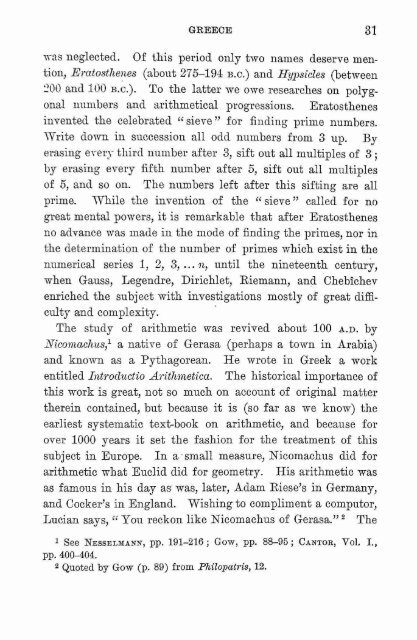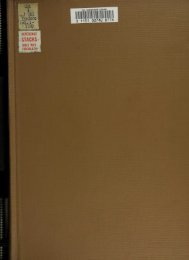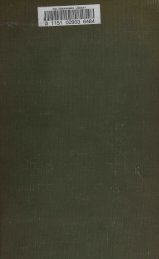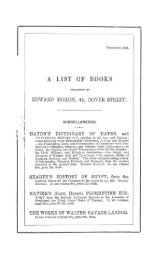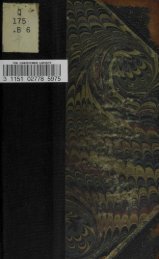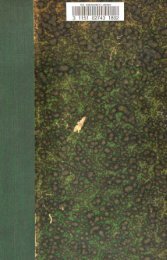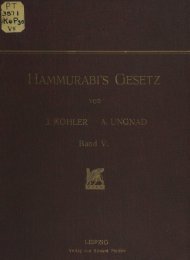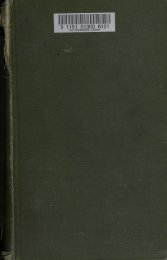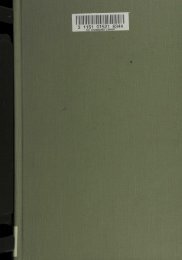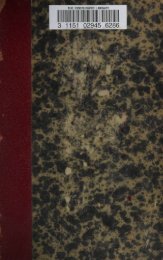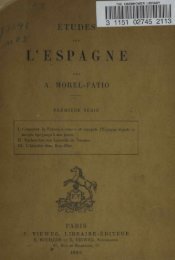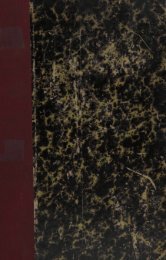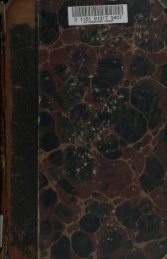- Page 7 and 8: A HISTORY OP ELEMENTARY MATHEMATICS
- Page 9 and 10: A HISTORY ELEMENTAEY MATHEMATIC8 HI
- Page 11 and 12: PREFACE "The education of the child
- Page 13 and 14: CONTENTS PAGE ANTIQUITY 1 NnMBER-ST
- Page 15 and 16: A HISTORY OF MATHEMATICS o>»«> AN
- Page 17 and 18: NUMBER-SYSTEMS AND NUMERALS 3 of Sw
- Page 19 and 20: NUMBER-SYSTE:StS AND NUMERALS 5 two
- Page 21 and 22: NTTMBEE-SYSTEMS AND NXJMEEALS /^ Hi
- Page 23 and 24: NUMBER-SYSTEMS AND NUMERALS 9 local
- Page 25 and 26: NUMBER-SYSTEMS AND NUMERALS 11 is d
- Page 27 and 28: NUMBER-SYSTEMS AND NUMERALS 13 book
- Page 29 and 30: NUMBER-SYSTEMS AND NUMERALS 15 1. T
- Page 31 and 32: NUMBER-SYSTEMS AND NUMERALS 17 unne
- Page 33 and 34: AEITHMETIC AND ALGEBEA EGYPT The mo
- Page 35 and 36: EGYPT 21 •\\-Titing the denominat
- Page 37 and 38: EGYPT 23 cation in arithmetics of t
- Page 39 and 40: EGYPT 25 goes, aiithmetic and algeb
- Page 41 and 42: GREECE 27 thus, ptyS" = YT2- Other
- Page 43 and 44: GREECE 27 Thus, pifi" = YT^. Other
- Page 45: GREECE 29 of grains in a sphere who
- Page 49 and 50: GREECE 33 numbers. Thus, 8 = 2=' =
- Page 51 and 52: GREECE 35 divorced from geometry, h
- Page 53 and 54: ROME 37 Diophantus coiild teach the
- Page 55 and 56: ROME 39 c (= 500\ and three buttons
- Page 57 and 58: ROME 41 dialogue between teacher an
- Page 59 and 60: GEOMETRY AND TEIGONOMETEY EGYPT AND
- Page 61 and 62: EGYPT AND BABYLONIA 45 ancient Egyp
- Page 63 and 64: GREECE 47 of science as science. Eo
- Page 65 and 66: GREECE 49 mations to the ratio tt o
- Page 67 and 68: GREECE 51 arithmetical fact has its
- Page 69 and 70: GREECE 53 With what degree of rigou
- Page 71 and 72: GREECE 55 We answer in the words of
- Page 73 and 74: GREECE 57 naturally failed to find
- Page 75 and 76: GREECE 59 bility of a line. He argu
- Page 77 and 78: GREECE 61 great value upon the mind
- Page 79 and 80: GREECE 63 of course, were more or l
- Page 81 and 82: GREECE 05 ters there Avas not a sho
- Page 83 and 84: GREECE 67 be found in Book X. The g
- Page 85 and 86: GREECE 69 sight of the general exce
- Page 87 and 88: GREECE 71 be a speedy reiurn to Euc
- Page 89 and 90: GREECE 73 The main differences in s
- Page 91 and 92: GREECE 75 The period in which Eucli
- Page 93 and 94: GREECE 77 etry as arithmetic. The r
- Page 95 and 96: GREECE 79 celebrated work on Conies
- Page 97 and 98:
GREECE 81 is exceedingly ingenious
- Page 99 and 100:
GREECE 83 two astronomical observat
- Page 101 and 102:
GREECE 85 their sum and difference,
- Page 103 and 104:
GREECE 87 his own, we mention the f
- Page 105 and 106:
ROME 89 of the figure. Thus to-day
- Page 107 and 108:
ROME 91 simplified matters immensel
- Page 109 and 110:
Hindus MIDDLE AGES AEITHMETIC AND A
- Page 111 and 112:
HINDUS 95 belong to mathematics.^ T
- Page 113 and 114:
HINDUS 97 324 x 753, was as follows
- Page 115 and 116:
HINDUS 99 quantity is sunya, and is
- Page 117 and 118:
HINDUS 101 of living creatures (sla
- Page 119 and 120:
ARABS 108 by them as a number. The
- Page 121 and 122:
ARABS 105 was foimd in the library
- Page 123 and 124:
ARABS 107 able writer, AbiYl Wafd,
- Page 125 and 126:
ARABS 109 Arabs, and of the later E
- Page 127 and 128:
EUROPE DURING THE MIDDLE AGES 111 s
- Page 129 and 130:
EUROPE DURING THE MIDDLE AGES 113 t
- Page 131 and 132:
EUROPE DURING THE MIDDLE AGES 115 -
- Page 133 and 134:
EUROPE DURING THE MIDDLE AGES 117 k
- Page 135 and 136:
EUROPE DURING THE MIDDLE AGES 119 e
- Page 137 and 138:
EUROPE DURING THE MIDDLE AGES 121 t
- Page 139 and 140:
HINDUS 123 figure in geometrical ma
- Page 141 and 142:
ARABS 125 formula sin-a-)-cos^a=;-^
- Page 143 and 144:
ARABS 127 nople. a large number of
- Page 145 and 146:
ARABS 129 is the geometric solution
- Page 147 and 148:
EUROPE DURING THE MIDDLE AGES 131 W
- Page 149 and 150:
EUROPE DURING THE MIDDLE AGES 133 u
- Page 151 and 152:
EUROPE DURING THE MIDDLE AGES 135 r
- Page 153 and 154:
EUROPE DURING THE MIDDLE AGES 137 s
- Page 155 and 156:
AEITHMETIC MODERN TIMES Its Develop
- Page 157 and 158:
MODERN TIMES 141 This work has beco
- Page 159 and 160:
MODERN TIMES 143 und siebentzig,"'
- Page 161 and 162:
MODERN TIMES 145 ter of this centur
- Page 163 and 164:
MODERN TIMES 147 Some books also gi
- Page 165 and 166:
MODERN TIMES 149 Eor a long time th
- Page 167 and 168:
MODERN TIMES 151 extracted the squa
- Page 169 and 170:
MODERN TIMES 158 of yards, rods, an
- Page 171 and 172:
MODERN TIMES 155 tions similar to t
- Page 173 and 174:
MODERN TIMES 157 metic, takes pains
- Page 175 and 176:
MODERN TIJtES 159 is indicated by t
- Page 177 and 178:
MODERN TIMES 161 ing is a copy of p
- Page 179 and 180:
MODERN TIMES 163 gian logarithms" o
- Page 181 and 182:
MODERN TIMES 165 his o-wn. It is ev
- Page 183 and 184:
MODERN TIMES 167 did his.' However,
- Page 185 and 186:
MODERN TIJIBS 169 Notice that the v
- Page 187 and 188:
MODERN TIMES 171 other similar unit
- Page 189 and 190:
MODERN TIMES 173 weight means "' Lo
- Page 191 and 192:
MODERN TIMES 175 varying the price
- Page 193 and 194:
MODERN TIMES 177 how standards are
- Page 195 and 196:
MODERN TIMES 179 Notation, are admi
- Page 197 and 198:
MODERN TIMES 181 progressions which
- Page 199 and 200:
MODERN TIMES 183 difficulty which i
- Page 201 and 202:
MODERN TIMES 185 advice. The method
- Page 203 and 204:
MODERN TENIES 187 the notches " tal
- Page 205 and 206:
MODERN TIMES 189 able to say that t
- Page 207 and 208:
MODERN TIJIES 191 anything ma,j be
- Page 209 and 210:
MODERN TIMES 193 the absence of all
- Page 211 and 212:
MODERN TIMES 195 for the change cou
- Page 213 and 214:
A 1. at Lond. 40 1, at Amst. 90 MOD
- Page 215 and 216:
MODERN TIMES 199 To the above subje
- Page 217 and 218:
MODERN TIMES 201 eighteenth century
- Page 219 and 220:
MODERN TIJIBS 203 does the problem
- Page 221 and 222:
MODERN TIMES 205 could not divide 2
- Page 223 and 224:
MODERN TIMES 207 sical men were evi
- Page 225 and 226:
MODERN TIMES 209 teaching, and yon
- Page 227 and 228:
MODERN TIMES 211 unnatural and has
- Page 229 and 230:
MODERN TIMES 218 mittance. At the t
- Page 231 and 232:
MODERN TIMES 216 not entirely new;
- Page 233 and 234:
MODERN TIMES 217 ;ive evidence of t
- Page 235 and 236:
MODERN TIMES 219 of the Intellectua
- Page 237 and 238:
MODERN TIMES 221 question is closel
- Page 239 and 240:
MODERN TIMES 223 of the eighteenth
- Page 241 and 242:
THE RENAISSANCE 225 Ms solution sec
- Page 243 and 244:
THE RENAISSANCE 227 Later a brillia
- Page 245 and 246:
THE RENAISSANCE 229 the fourth root
- Page 247 and 248:
THE RENAISSANCE 231 He was the firs
- Page 249 and 250:
THE RENAISSANCE 233 but Girard had
- Page 251 and 252:
THE LAST THREE CENTURIES 235 but St
- Page 253 and 254:
THE LAST THREE CENTURIES 2-37 John
- Page 255 and 256:
THE LAST THREE CENTURIES 239 his pr
- Page 257 and 258:
THE LAST THREE CENTURIES 241 long a
- Page 259 and 260:
THE LAST THREE CENTURIES 243 that -
- Page 261 and 262:
EDITIONS OP EUCLID 245 A flood of a
- Page 263 and 264:
EARLY RESEARCHES 247 of the more in
- Page 265 and 266:
EARLY RESE.JiRCHES 249 geometry is
- Page 267 and 268:
EARLY RESEARCHES 251 treatise on tr
- Page 269 and 270:
SYNTHETIC GEOMETRY 253 = ^4J5 • A
- Page 271 and 272:
SYNTHETIC GEOMETRY 255 pages, beari
- Page 273 and 274:
SYNTHETIC GEOMETRY 257 Euclidean Ge
- Page 275 and 276:
ELEMENTARY GEOMETRY 259 n. Modern G
- Page 277 and 278:
ELEMENTARY GEOMETRY 261 was forgott
- Page 279 and 280:
ELEMENTARY GEOMETRY 263 JLB and ED'
- Page 281 and 282:
ELEMENTARY GEOMETRY 265 with centre
- Page 283 and 284:
ELEMENTARY GEOMETRY 267 of Halle, T
- Page 285 and 286:
ELEMENTARY GEOMETRY 269 given by Jo
- Page 287 and 288:
ELEMENTARY GEOMETRY 271 not exceed
- Page 289 and 290:
ELEMENTARY GEOMETEY 273 A similar s
- Page 291 and 292:
ELEMENTARY GEOMETEY 275 We have tou
- Page 293 and 294:
ELEMENTARY GEOMETRY 277 Loria's est
- Page 295 and 296:
ELEMENTARY GEOMETRY 279 were member
- Page 297 and 298:
ELEMENTARY GEOMETRY 281 Preparatory
- Page 299 and 300:
ELEMENTAnY GEOMETRY 283 introducing
- Page 301 and 302:
ELEMENTARY GEOMETRY 285 matical min
- Page 303 and 304:
ELEMENTARY GEOMETRY 287 m and n, we
- Page 305:
ELEMENTARY GEOMETRY 289 gaps in rea
- Page 308 and 309:
292 INDEX Apollonius, 65, 75, 78-80
- Page 310 and 311:
294 INDEX Colla, 224. Combinations,
- Page 312 and 313:
296 INDEX Friedlein, 8, 14, 26, 32,
- Page 314 and 315:
298 INDEX Jones, "W., 200. Jonquier
- Page 316 and 317:
300 INDEX Ohm, M., 244. Oldenburg,
- Page 318 and 319:
302 INDEX Schotten, H., 2.30. Schre
- Page 320 and 321:
304 INDEX •Wingate, 153, 173; 187
- Page 322 and 323:
MATHEMATICAL TEXT-BOOKS SUITABLTE F
- Page 324 and 325:
OF SECOND AMERICAN EDITION Hall and


